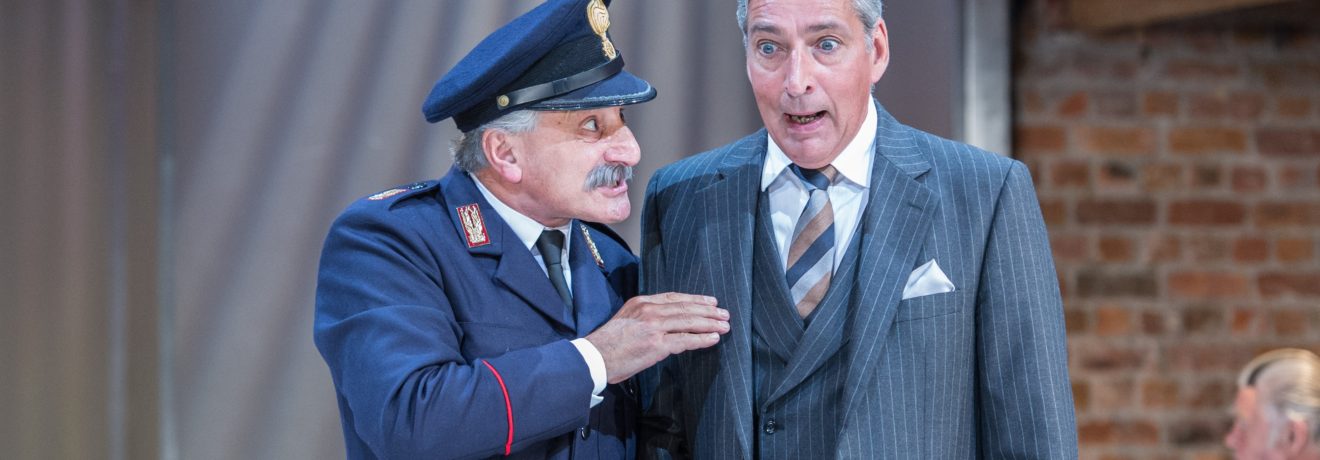Theater Reviews
Brief Take on RSC Volpone

 Jonson’s comedies usually come in for large doses of updating, as his topical humor requires footnotes; with its substantial rewrites, Trevor Nunn’s current RSC production of Volpone skewers a wide range of 21st-century humors. Stephen Brimson Lewis’s slick design incorporates video screens that with a click of his remote, Volpone switches from the DOW figures to his faked vital signs. Lady Would-Be (Annette McLoughlin), channeling the newly-blonde Kim Kardashian, has a camera crew and an entourage of makeup assistants ensuring that every over-the-top reaction is media-ready. Trying to ingratiate herself with Volpone, she offers to read aloud to him: “Which of your poets? Petrarch, or Tasso, or Dante? Dante looks well,” adding an interpolated aside, “I love a comedy.” Sir Politic’s commonplace-book is updated to an iPhone, on which he earnestly tweets his most banal activities: “At St. Mark I urined.” Peregrine, here a backpacking college student, pretends to be impressed: “’Faith, these are politic notes!” Their discussion of “things concurring, strange, /And full of omen” adds a reference to “this widely fabled warming of the globe,” and Sir Politic’s proposed scheme for catching traitors by having them fart in glass jars sounds like a carnival-mirror image of the Stasi’s former practice of keeping seat covers on which people had been interrogated. Facebook, breast-augmenting surgery, vegetarians, the Patriot Act—all fodder for Nunn’s witty updated script.
Jonson’s comedies usually come in for large doses of updating, as his topical humor requires footnotes; with its substantial rewrites, Trevor Nunn’s current RSC production of Volpone skewers a wide range of 21st-century humors. Stephen Brimson Lewis’s slick design incorporates video screens that with a click of his remote, Volpone switches from the DOW figures to his faked vital signs. Lady Would-Be (Annette McLoughlin), channeling the newly-blonde Kim Kardashian, has a camera crew and an entourage of makeup assistants ensuring that every over-the-top reaction is media-ready. Trying to ingratiate herself with Volpone, she offers to read aloud to him: “Which of your poets? Petrarch, or Tasso, or Dante? Dante looks well,” adding an interpolated aside, “I love a comedy.” Sir Politic’s commonplace-book is updated to an iPhone, on which he earnestly tweets his most banal activities: “At St. Mark I urined.” Peregrine, here a backpacking college student, pretends to be impressed: “’Faith, these are politic notes!” Their discussion of “things concurring, strange, /And full of omen” adds a reference to “this widely fabled warming of the globe,” and Sir Politic’s proposed scheme for catching traitors by having them fart in glass jars sounds like a carnival-mirror image of the Stasi’s former practice of keeping seat covers on which people had been interrogated. Facebook, breast-augmenting surgery, vegetarians, the Patriot Act—all fodder for Nunn’s witty updated script.
In Hugh Hefner-style silk dressing gown and Italian suits, Henry Goodman’s Volpone is an elegant and attractive gent; he brings a cheeky Runyonesque charm to his private scenes, and displays his singing talent (indeed, he played Nathan Detroit in London in the ‘90’s) in his Italian mountebank disguise. To look deathly ill, he dons a greasy, stringy wig, adds drops to make his eyes runny, and doffs the dressing gown to reveal a hospital garment that ties up the back. The character is a consummate deceiver, but Goodman even manages to deceive the audience into believing that his passion for Corvino’s beautiful young wife is genuine—at least, for a time. We realize our mistake when he gets her alone: a bordello-style bed rises from a trapdoor, and the video screens reveal that all that happens on the bed will be filmed. Rhiannon Handy‘s Celia, speaking with an Eastern European accent, is a mail-order possession over whom Corvino (a splenetic Matthew Kelly) exercises despotic control, as does Volpone, cuffing Celia’s ankle to the bed. As his seduction plan goes awry and Bonario rescues her, Volpone becomes increasingly manic—his success in the courtroom is due less his own feats than to the blind malice of the greedy ones. He comes up with the idea to fake his own death with the help of a nasal-spray hit of cocaine, as arrogantly blind as the jackals circling around his fortune. He fails to see the danger in Mosca (the rather subdued Orion Lee), not realizing that his servant has been playing the long con.
As the production hurtles toward resolution, there are only two light moments in the sour impositions of sentences. Finally cleared of the accusation of guilt, and absolved of her unhappy marriage, Celia defiantly and passionately kisses Bonario in front of her erstwhile husband. After the others are punished, Volpone steps forward to deliver the epilogue; Goodman’s friendly grin pulls the tone back to one of comedy as he invites us not to take these events too seriously, as after all, Volpone’s tricks did not hurt us.
Article Keywords: jonson, royal shakespeare company, rsc, shakespeare, swan theatre, volpone.
